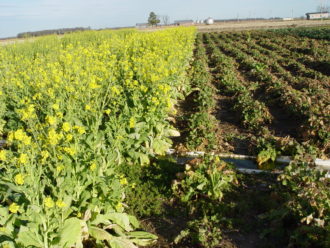GRIFFIN, Georgia – The Southern Sustainable Agriculture Research and Education (SSARE) program has awarded its 2020 Producer Grants to farmers interested in conducting on-farm research to further sustainable agriculture practices across the region.
Funded projects, totaling $112,691, include:
FS20-321 Sustainable Sidedress Nitrogen Applications for Early Corn and Cotton Using Unmanned Aerial Systems, $14,961, Louisiana
FS20-322 Increasing Sustainability of Crawfish and Low Salinity Shrimp Production in West Alabama, $12,581, Alabama
FS20-323 Evaluating Mobile Slaughter Access for Producers and Local Partners, $10,700, Florida
FS20-324 Building Soil and Plant Health with Compost and Compost Teas, $12,443, Puerto Rico
FS20-325 Breeding and Evaluating of Butternut Squash Varieties for Southeast Organic Farms, $19,846, Virginia
FS20-326 Summer Cover Crops for Organic No-till Broccoli, $14,820, South Carolina
FS20-327 Testing Vegetable Varieties in Tropical Conditions on St. Croix, USVI for Farm to School Crop Production, $12,480, U.S. Virgin Islands
FS20-328 Testing Methods to Develop a Soil Food Web in Clay Soils, $14,860, Georgia
Southern SARE Producer Grants are intended for farmers and farmer groups who wish to conduct small research projects on a wide variety of sustainable ag practices, ranging from agroforestry to conservation practices to pest and disease management to organic production. Funding ranges from $15,000 for individual farmers and $20,000 for farmer groups for up to a two-year project. Producer Grant Call for Proposals open in September with funding announced February the following year.
For more information on Producer Grants, visit https://southern.sare.org.
Published by the Southern Region of the Sustainable Agriculture Research and Education (SARE) program. Funded by the USDA National Institute of Food and Agriculture (NIFA), Southern SARE operates under cooperative agreements with the University of Georgia, Fort Valley State University, and the Kerr Center for Sustainable Agriculture to offer competitive grants to advance sustainable agriculture in America's Southern region. This material is based upon work that is supported by the National Institute of Food and Agriculture, U.S. Department of Agriculture, through Southern Sustainable Agriculture Research and Education. USDA is an equal opportunity employer and service provider. Any opinions, findings, conclusions, or recommendations expressed in this publication are those of the author(s) and do not necessarily reflect the view of the U.S. Department of Agriculture.
